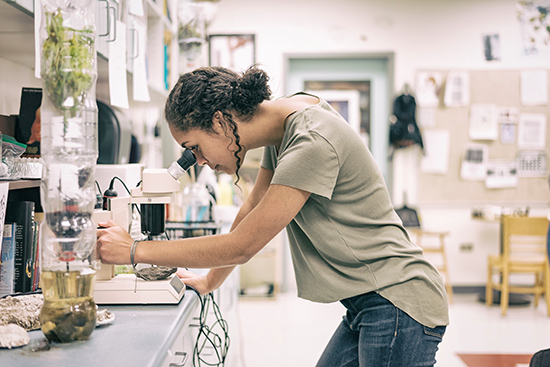Stories | July 30, 2018 | Read Time: 6 minutes
Spreading the Seeds of Agricultural Knowledge
Only when people understand the intricacies of agriculture can we effectively continue making advancements in food security and sustainability. That is why Monsanto is constantly looking for ways to engage the public in this conversation. Here are some of our most recent education outreach initiatives.
Agriculture in the Classroom
Teachers from across Nebraska recently gathered for the Nebraska Career Education Conference where Monsanto Production Manager Hannah Neuenschwander presented “The Scoop on GMOs.” Teachers learned more about the solutions we provide farmers through discussion and hands-on activities.
After discussing the different methods of modifying an organism’s genome as well as the science behind our insect resistant and herbicide tolerant products, attendees were given a scenario in which they had to determine who stole soybean grain from a local bakery. Armed only with samples of the bakery’s and suspect’s soybeans and their new knowledge of genome modification, the teachers tested the differences between the two samples’ DNA through genotyping. If the suspect’s sample matched the bakery’s, then they had found the thief.
This simple activity is only one of the great projects designed to help teachers introduce agriculture into their Science, Technology, Engineering, and Mathematics (STEM) curriculum. Teachers were sent back to the classroom with access to the National Agriculture in the Classroom’s biotechnology soybean kit as well as a wealth of resources, lesson plans, and activities.


Students in Summer STEM Immersion Program Visit Monsanto's Chesterfield Village Research Center
Students from St. Louis schools John Burroughs High School and Cor Jesu Academy recently visited our Chesterfield Village Research Center for an immersive day of STEM experiences. A total of 40 bright, young minds toured the site and were given a sneak peek of our newly redesigned Technology Development Center.
After their tours, both groups met with members of the Monsanto team to discuss topics like biofuels, mechanical engineering in modern agriculture, honey bee health and physiology, sustainability in modern agriculture, and careers and internships.
Students also worked through hands-on activities exploring the possibilities of putting STEM learning into practice in agriculture. Activities included the Farmer Choices Game, in which students were asked to make many of the same decisions farmers make each season in hopes of creating a profit for their farm, and the Armadillo Challenge, an inquiry-based learning activity in which they were asked to solve the problem of armadillo boroughs causing potential safety risks in the field.
Monsanto's Williamsburg Pollinator Habitat Helps Educate Community
Our Williamsburg, Iowa site recently hosted a “Pollinator Power Day” for more than 50 children from the surrounding communities. The site’s three-acre pollinator habitat was the perfect setting for teaching the youngsters about the importance of pollinators to the global food supply.
As the children explored the habitat, they stopped at multiple interactive booths featuring presentations and activities. The Mighty Monarchs station provided an opportunity to learn about the site’s monarch rearing tent, monarch migration, and the monarch lifecycle. The Bees and Agriculture station showcased the site’s five beehives, along with a display hive which has been fitted with clear sides so visitors can see the inner workings of the hive. Additionally, the kids had the chance to participate in plant and bug identification with lessons on which to avoid.
Employees at the site are continuing to explore additional community outreach and education events.
Seminis Vegetable Donates Seeds to Mississippi Farm Club

For the second year in a row, our Woodland, California Seminis Vegetable site donated various vegetable seeds to Pleasant Hill Elementary School in northern Mississippi. The school’s Farm Club plants a garden each year to teach students about the importance of agriculture and connect them to the food at a deeper level than the grocery store.
This year, the club planted cucumber seeds. After caring for the plants as they grew into maturity, the students then harvested their cucumbers. While several were eaten as-is, the rest were thrown a party! Specifically, they had a “pickling” party, where the students learned how to turn cucumbers into pickles.
The experience of growing and caring for their own crops from seed to pickling jar provided students with the opportunity to live just a small part of agriculture outside of the grocery store.
Biotech Summer Camp Visits Juana Diaz Site in Puerto Rico
For the fifth year in a row, students from the Jose N. Gandara High School in Aibonito toured our Juana Diaz site. These students were participating in a Biotech Summer Camp which focuses on providing high school students interested in scientific fields a first-hand experience on different aspects, tasks and career opportunities in modern agriculture.
During their visit, Monsanto employees gave presentations on safety, breeding and biotechnology, and an overview of our Puerto Rico operations. In addition, the students visited one of our smart greenhouses which includes the complete automation of some processes like sowing, harvesting, and seed production.
Biotechnology Educational materials Donated to Schools in Japan
Teachers in Japan were searching for the most up-to-date and science-based materials to educate their students about biotechnology and agriculture. So, Monsanto Japan partnered with the Association of Corporation and Education (ACE) and Life & Bio Plaza 21 to produce comprehensive educational materials titled “Biotechnology – Backbone of Agriculture” which were then donated to junior high and high schools across Japan.
These easy-to-understand materials discuss the “Basics of Plant Breeding,” “Genetically Modified Organisms,” and “Genetic Modification Technology in Our Daily Life,” and include lesson plans, supporting slides, a DVD, and a genetically modified (GM) protein detection experiment kit with both GM and non-GM soybeans.
"Making proper self-judgment is something I would like my students to learn and absorb, and the materials are the perfect tool to do so,” explained Mr. Nakamura, recipient of these materials and teacher at Suwadai Junior High School in Tokyo.
Expand Your Own Modern Agriculture Knowledge
Explore the great resources on ModernAg.org and GMOAnswers.com for more about the science of GMOs and biotechnology in modern agriculture.









